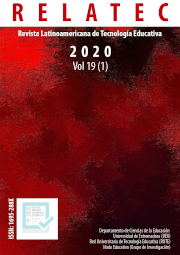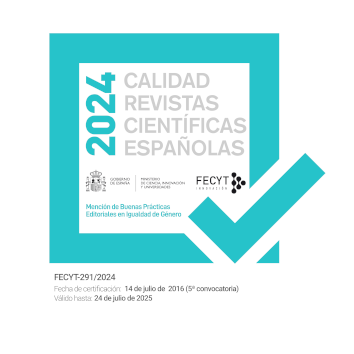Revisão sistemática sobre características de gestão de tempo na realização de atividades educacionais em sistemas de gerenciamento de aprendizagem
DOI:
https://doi.org/10.17398/1695-288X.19.1.63Palavras-chave:
Gestão de Tempo, Learning Analytics, Mineração de Dados Educacionais, Revisão Sistemática da Literatura, Learning Management SystemsResumo
O uso de sistemas de gerenciamento da aprendizagem vem se tornando frequente como forma de ensino-aprendizagem. Isto se deve ao fato dele possibilitar maior flexibilidade de tempo e espaço em relação à aprendizagem presencial. Assim, este trabalho tem por objetivo apresentar como as áreas de Mineração de Dados Educacionais e Learning Analytics estão contribuindo para extração de conhecimento da autorregulação da gestão de tempo em ambientes de e-learning. Para isso, consideramos o conceito de gestão de tempo de Pintrich (2000) e realizamos uma revisão sistemática de literatura. Com isso, foi possível perceber que a maioria dos trabalhos analisados não objetivam pesquisar sobre a gestão de tempo, ainda que reporte resultados sobre. Também percebemos que os dados, que representam a gestão de tempo, utilizados nas pesquisas são dados agregados, isto é, o fenômeno não é estudado ao longo do tempo. Com estes resultados tem-se uma visão geral de como o campo de Learning Analytics e a Mineração de Dados Educacionais estão contribuindo para extração de conhecimento sobre autorregulação da gestão de tempo em ambientes online.
Downloads
Referências
Bittencourt, I. I., & Isotani, S. (2018). Informática na Educação baseada em Evidências: Um Manifesto. Revista Brasileira de Informática Na Educação, 26(3), 108. https://doi.org/10.5753/rbie.2018.26.03.108
Boroujeni, M. S., Sharma, K., Kidziński, Ł., Lucignano, L., & Dillenbourg, P. (2016). How to Quantify Student’s Regularity? In Adaptive and Adaptable Learning (pp. 277–291). Springer International Publishing. https://doi.org/10.1007/978-3-319-45153-4_21
Broadbent, J., & Poon, W. L. (2015). Self-regulated learning strategies & academic achievement in online higher education learning environments: A systematic review. The Internet and Higher Education, 27, 1–13. https://doi.org/10.1016/j.iheduc.2015.04.007
Cerezo, R., Esteban, M., Sánchez-Santillán, M., & Núñez, J. C. (2017). Procrastinating Behavior in Computer-Based Learning Environments to Predict Performance: A Case Study in Moodle. Frontiers in Psychology, 8. https://doi.org/10.3389/fpsyg.2017.01403
Claessens, B. J. C., van Eerde, W., Rutte, C. G., & Roe, R. A. (2007). A review of the time management literature. Personnel Review, 36(2), 255–276. https://doi.org/10.1108/00483480710726136
Dunlosky, J., & Ariel, R. (2011). The influence of agenda-based and habitual processes on item selection during study. Journal of Experimental Psychology: Learning, Memory, and Cognition, 37(4), 899–912. https://doi.org/10.1037/a0023064
Feldmann, B. (2014). Two Decades of e-learning in Distance Teaching – From Web 1.0 to Web 2.0 at the University of Hagen. In Communications in Computer and Information Science (pp. 163–172). Springer International Publishing. https://doi.org/10.1007/978-3-319-10671-7_16
Hadwin, A., Järvelä, S., & Miller, M. (2017, August 31). Self-Regulation, Co-Regulation, and Shared Regulation in Collaborative Learning Environments. Retrieved from https://www.routledgehandbooks.com/doi/10.4324/9781315697048.ch6
Jo, I.-H., Kim, D., & Yoon, M. (2014). Analyzing the log patterns of adult learners in LMS using learning analytics. In Proceedings of the Fourth International Conference on Learning Analytics And Knowledge - LAK ’14. ACM Press. https://doi.org/10.1145/2567574.2567616
Jo, I.-H., Yu, T., Lee, H., & Kim, Y. (2014). Relations between Student Online Learning Behavior and Academic Achievement in Higher Education: A Learning Analytics Approach. In Emerging Issues in Smart Learning (pp. 275–287). Springer Berlin Heidelberg. https://doi.org/10.1007/978-3-662-44188-6_38
Jo, Il-Hyun & Kim, Dongho & Yoon, Meehyun. (2015). Constructing proxy variables to measure adult learners' time management strategies in LMS. Educational Technology and Society. 18. 214-225.
Kim, D., Yoon, M., Jo, I.-H., & Branch, R. M. (2018). Learning analytics to support self-regulated learning in asynchronous online courses: A case study at a women’s university in South Korea. Computers & Education, 127, 233–251. https://doi.org/10.1016/j.compedu.2018.08.023
Kitchenham, B., & Charters, S. (2007). Guidelines for performing systematic literature reviews in software engineering. Tech. Rep. EBSE 2007-001, Keele University and Durham University Joint Report.
Lee, Y. (2018). Effect of uninterrupted time-on-task on students’ success in Massive Open Online Courses (MOOCs). Computers in Human Behavior, 86, 174–180. https://doi.org/10.1016/j.chb.2018.04.043
Littlejohn, A., Hood, N., Milligan, C., & Mustain, P. (2016). Learning in MOOCs: Motivations and self-regulated learning in MOOCs. The Internet and Higher Education, 29, 40–48. https://doi.org/10.1016/j.iheduc.2015.12.003
Mega, C., Ronconi, L., & De Beni, R. (2014). What makes a good student? How emotions, self-regulated learning, and motivation contribute to academic achievement. Journal of Educational Psychology, 106(1), 121–131. https://doi.org/10.1037/a0033546
Nadinloyi, K. B., Hajloo, N., Garamaleki, N. S., & Sadeghi, H. (2013). The Study Efficacy of Time Management Training on Increase Academic Time Management of Students. Procedia - Social and Behavioral Sciences, 84, 134–138. https://doi.org/10.1016/j.sbspro.2013.06.523
Panadero, E. (2017). A Review of Self-regulated Learning: Six Models and Four Directions for Research. Frontiers in Psychology, 8. https://doi.org/10.3389/fpsyg.2017.00422
Pintrich, P. R. (2000). The Role of Goal Orientation in Self-Regulated Learning. In Handbook of Self-Regulation (pp. 451–502). Elsevier. https://doi.org/10.1016/b978-012109890-2/50043-3
Pintrich, P. R. (2004). A Conceptual Framework for Assessing Motivation and Self-Regulated Learning in College Students. Educational Psychology Review, 16(4), 385–407. https://doi.org/10.1007/s10648-004-0006-x
Rasid, N., Nohuddin, P. N. E., Alias, H., Hamzah, I., & Nordin, A. I. (2017). Using Data Mining Strategy in Qualitative Research. In Advances in Visual Informatics (pp. 100–111). Springer International Publishing. https://doi.org/10.1007/978-3-319-70010-6_10
Siemens, G., & Baker, R. S. J. d. (2012). Learning analytics and educational data mining. In Proceedings of the 2nd International Conference on Learning Analytics and Knowledge - LAK ’12. ACM Press. https://doi.org/10.1145/2330601.2330661
Tabuenca, B., Kalz, M., Drachsler, H., & Specht, M. (2015). Time will tell: The role of mobile learning analytics in self-regulated learning. Computers & Education, 89, 53–74. https://doi.org/10.1016/j.compedu.2015.08.004
Wolters, C. A., Won, S., & Hussain, M. (2017). Examining the relations of time management and procrastination within a model of self-regulated learning. Metacognition and Learning, 12(3), 381–399. https://doi.org/10.1007/s11409-017-9174-1
Won You, Ji. (2015). Examining the Effect of Academic Procrastination on Achievement Using LMS Data in e-Learning. Educational Technology and Society. 18. 64-74.
Yen, C.-J., Tu, C.-H., Sujo-Montes, L. E., Armfield, S. W. J., & Chan, J.-Y. (2013). Learner Self-Regulation and Web 2.0 Tools Management in Personal Learning Environment. International Journal of Web-Based Learning and Teaching Technologies, 8(1), 46–65. https://doi.org/10.4018/jwltt.2013010104
You, J. W. (2016). Identifying significant indicators using LMS data to predict course achievement in online learning. The Internet and Higher Education, 29, 23–30. https://doi.org/10.1016/j.iheduc.2015.11.003
Zacharis, N. Z. (2015). A multivariate approach to predicting student outcomes in web-enabled blended learning courses. The Internet and Higher Education, 27, 44–53. https://doi.org/10.1016/j.iheduc.2015.05.002
Zimmerman, B. J. (1989). A social cognitive view of self-regulated academic learning. Journal of Educational Psychology, 81(3), 329–339. https://doi.org/10.1037/0022-0663.81.3.329
Zimmerman, B. J. (2000). Attaining Self-Regulation. In Handbook of Self-Regulation (pp. 13–39). Elsevier. https://doi.org/10.1016/b978-012109890-2/50031-7
Zimmerman, B. J. (2002). Becoming a Self-Regulated Learner: An Overview. Theory Into Practice, 41(2), 64–70. https://doi.org/10.1207/s15430421tip4102_2
Downloads
Publicado
Edição
Secção
Licença
Los autores/as que publiquen en esta revista aceptan las siguientes condiciones:
1. Los autores/as conservan los derechos de autor y ceden a la revista el derecho de la primera publicación, con el trabajo registrado con la licencia Creative Commons Reconocimiento-NoComercial-SinObraDerivada 4.0 International (CC BY-NC-ND), que permite a terceros utilizar lo publicado siempre que mencionen la autoría del trabajo y a la primera publicación en esta revista.
2. Los autores/as pueden realizar otros acuerdos contractuales independientes y adicionales para la distribución no exclusiva de la versión del artículo publicado en esta revista (p. ej., incluirlo en un repositorio institucional o publicarlo en un libro) siempre que indiquen claramente que el trabajo se publicó por primera vez en esta revista.
3. Se permite y recomienda a los autores/as a publicar su trabajo en Internet (por ejemplo en páginas institucionales o personales) antes y durante el proceso de revisión y publicación, ya que puede conducir a intercambios productivos y a una mayor y más rápida difusión del trabajo publicado (vea The Effect of Open Access).









